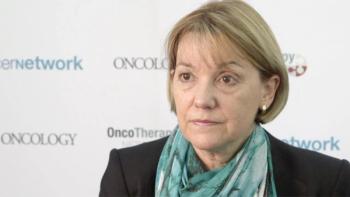
Female survivors of childhood acute lymphoblastic leukemia were at risk for neurocognitive impairment and were more susceptible to the effects of sleep disturbance and fatigue compared with their male counterparts.

Your AI-Trained Oncology Knowledge Connection!


Female survivors of childhood acute lymphoblastic leukemia were at risk for neurocognitive impairment and were more susceptible to the effects of sleep disturbance and fatigue compared with their male counterparts.

A new study is suggesting that intravenous and subcutaneous rituximab share similar efficacy and safety profiles.

Patients undergoing allo-HSCT can remain immune-impaired for several years after treatment, but methods such as adopting guideline-driven tracking tools to determine which patients have been assessed for immunization eligibility can improve vaccination rates, suggest a feasibility study at ONS.

This video examines the challenge in optimizing and standardizing molecular monitoring for patients with chronic myeloid leukemia.

New evidence is suggesting that extensive immune profiling of sarcomas may unlock likely subtypes susceptible to immunotherapy.

On April 28, 2017, the US Food and Drug Administration approved midostaurin (Rydapt) for treating newly diagnosed FLT3-mutated acute myeloid leukemia and three types of systemic mastocytosis.

Maintenance lenalidomide significantly prolonged progression-free survival in elderly patients with diffuse large B-cell lymphoma who responded to first-line R-CHOP.

Single-agent use of blinatumomab resulted in anti-leukemic activity in patients with tyrosine kinase inhibitor–relapsed or refractory Philadelphia chromosome positive B-precursor acute lymphoblastic leukemia.

Treatment with ponatinib yielded better overall survival compared with allogeneic stem cell transplantation in patients with chronic phase chronic myeloid leukemia with a T315I mutation.

Global inequities in childhood leukemia survival have narrowed in recent years but still persist, according to data from CONCORD-2.

Kinase oncoproteins and growth factors both activate the proto-oncogene c-FOS and DUSP1, allowing the persistence of residual leukemia cell populations despite tyrosine kinase inhibitor therapy.

Combined treatment with lenalidomide, bortezomib, and dexamethasone plus transplantation significantly delayed progression in patients with multiple myeloma.

Patients with mucosa-associated lymphoid tissue (MALT) lymphoma had improved event-free survival when treated with chlorambucil plus rituximab compared with either therapy alone.

Unmutated immunoglobulin heavy chain variable region gene (IGHV) status does not adversely impact survival among ibrutinib-treated patients with chronic lymphocytic leukemia/small lymphocytic lymphoma.

This video reviews results of the ZUMA-1 trial, which tested the CAR T-cell therapy axicabtagene ciloleucel in patients with advanced non-Hodgkin lymphoma.

This video reviews results of the phase II CHRONOS-1 trial, a single-arm study evaluating the investigational agent copanlisib in patients with relapsed or refractory indolent non-Hodgkin lymphoma.

An experimental compound known as G100 may be a potentially viable agent for local control of metastatic soft tissue sarcomas.

Low pretreatment disease burden improved durability of CAR T-cell therapy in patients with relapsed B-cell acute lymphoblastic leukemia.

The JAK2 and FLT3 inhibitor pacritinib induced significant and sustained spleen volume reduction and symptom reduction in patients with myelofibrosis.

Treatment of CML with tyrosine kinase inhibitors including imatinib, nilotinib, and dasatinib can be associated with subclinical pulmonary hypertension.

Patients with relapsed or refractory multiple myeloma experienced significant indirect social costs from their disease, in addition to the direct costs.

This video examines research that found that certain genetic variations of both leukemia patients undergoing bone marrow transplant and their unrelated donors were associated with poor outcomes.

Patients who have survived Hodgkin lymphoma were at more than double the risk for diagnosis with a second cancer, according to the results of a recent study.

Dose-attenuated bortezomib, cyclophosphamide, and dexamethasone (VCD-lite) is a viable treatment option for vulnerable or frail adults with newly diagnosed multiple myeloma.

During maintenance therapy for childhood ALL, there was a general increase in DNA-incorporated thioguanine nucleotides (DNA-TGN), and this increase was associated with a lower frequency of disease relapse.